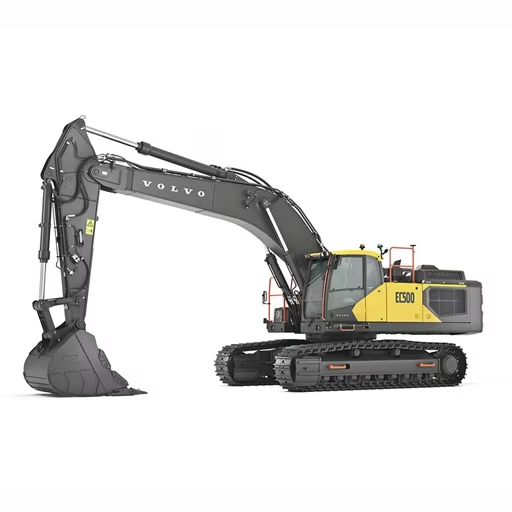Explore the rich history of Volvo excavators, from early hydraulic innovations to today's eco-friendly and smart machines.
Volvo has long been a name synonymous with quality and durability, not only in the world of cars but also in the heavy machinery industry. Over the years, Volvo excavators have become an essential part of construction sites worldwide, thanks to their advanced engineering and reliability. Let's take a walk through history and see how Volvo excavators evolved into the powerful machines they are today.
Early Beginnings: The Birth of Volvo Construction Equipment
The history of Volvo Construction Equipment can be traced back to 1832, long before the company entered the excavator market. Volvo began as a small machine workshop in Eskilstuna, Sweden, producing various equipment for agricultural and industrial use. However, it wasn’t until the 1920s that the company officially entered the construction machinery industry, and a new chapter of innovation began.
Volvo started producing construction vehicles and soon became known for its rugged, reliable machines. It was in the 1950s when Volvo first began designing hydraulic excavators, which marked a significant leap in the company’s product offerings.
The 1960s and 70s: Hydraulic Breakthroughs
The introduction of hydraulic systems in the 1960s revolutionized the excavator industry, and Volvo was at the forefront of this shift. In 1968, Volvo launched its first hydraulic excavator, the Volvo H10, which was a game-changer in the market. This model was efficient, powerful, and a great success for the company, laying the foundation for future innovations.
During the 1970s, Volvo continued to refine its excavators by incorporating more advanced hydraulics and improving operator comfort. The focus on durability and ease of use made Volvo a trusted name in the industry, and their machines started appearing on construction sites around the globe.
Expansion and Growth in the 1980s and 90s
As the 1980s rolled in, Volvo was ready to expand its lineup and make a bigger impact on the global construction market. The company introduced a variety of models that catered to different construction needs, from compact excavators perfect for urban projects to large excavators built for mining and heavy-duty tasks.
In 1991, Volvo further expanded by acquiring Samsung’s construction equipment division, significantly boosting its presence in the Asian market. This acquisition allowed Volvo to increase its production capabilities and tap into new technologies, ultimately strengthening its position as a leader in the excavator world.
The 1990s were a time of continuous innovation for Volvo. During this period, Volvo introduced its patented CareTrack system, one of the first telematics systems for heavy equipment. This technology allowed operators to monitor machine performance remotely, improving efficiency and reducing downtime.
The 2000s: A Focus on Sustainability and Innovation
As environmental concerns grew in the 2000s, Volvo machines became more focused on sustainability. Volvo introduced hybrid excavators, significantly reducing fuel consumption and lowering carbon emissions while maintaining the power and efficiency that Volvo was known for. This focus on green technology made Volvo a pioneer in eco-friendly construction equipment.
At the same time, Volvo continued to enhance its excavators' design and comfort. The inclusion of advanced hydraulic systems, fuel-efficient engines, and ergonomic cabs made Volvo excavators a favorite among operators who valued both performance and comfort on the job.
The Modern Era: Leading the Way in Smart Technology
Today, Volvo construction machines are at the cutting edge of technology. Volvo has embraced automation and connectivity in its latest excavators, with machines that are smarter and more efficient than ever. The use of advanced telematics, AI-assisted controls, and semi-autonomous systems helps construction companies boost productivity while ensuring safety on the job site.
Volvo's latest line of electric excavators also showcases its commitment to sustainability. These models produce zero emissions and operate quietly, making them ideal for urban projects where noise and pollution are concerns.
Volvo Excavators: A Trusted Legacy
From the early hydraulic models to the electric and smart excavators of today, Volvo’s journey in the excavator industry has been one of constant innovation and growth. Whether you’re looking for a compact model to handle urban construction or a heavy-duty machine for massive earthmoving tasks, Volvo’s extensive range of excavators delivers.
With nearly a century of experience in building some of the most reliable and advanced machines in the world, Volvo continues to set the standard for excellence in the construction machinery industry.
Their commitment to sustainability, operator comfort, and technological advancement ensures that Volvo excavators remain a top choice for contractors, operators, and construction firms across the globe.
Volvo’s history in the excavator industry is rich with milestones that showcase its dedication to building powerful, durable, and sustainable machines. From its early hydraulic breakthroughs to today’s smart, eco-friendly models, Volvo excavators have earned their place as leaders in the construction world, promising reliability and innovation for years to come.



No comments:
Post a Comment